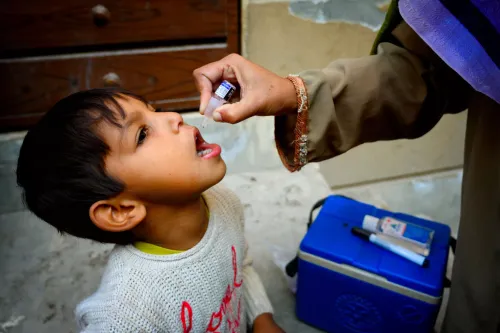Islamabad, June 5: In more worrying news for Pakistan, poliovirus has been detected in samples taken from two more districts of the country — Dera Ismail Khan and Bahawalpur – in the country’s Punjab province. This takes the number of polio infected districts in Pakistan to 42.
Polio remains a lingering case of worry in Pakistan as it is the only country apart from Afghanistan where it is still endemic, and despite rigorous efforts and international funding, Pakistan is a far cry away from eradicating the virus.
Besides, 15 environmental samples have been found positive, taking the tally of positive samples this year to 168.
According to the National Institute of Health (NIH), 15 new detections of the Type-1 Wild Poliovirus (WPV1) have been confirmed.
“Last year, there were 126 environmental sample isolation from 28 districts,” an official of the lab told Dawn.
Officials blamed poor performance of a partner-led programme over the last two seasons — 2022-23 and 2023-24 — resulting in a wide immunity gap favouring the current spread of the virus.
According to the Pakistan Polio Eradication Programme, samples contained the virus that was genetically linked to the imported YB3A genetic cluster, like all other detections in the country this year.
This situation underscores significant challenges faced by Pakistani authorities in eliminating the crippling disease. Attacks on polio workers remain frequent, with radical groups spreading misinformation about the immunisation program which has been marred by violence.
This year alone, 11 police personnel have died while providing security for polio vaccination campaigns in Khyber Pakhtunkhwa (KP) province. In a recent incident on June 3, unidentified gunmen attacked a polio team in Lakki Marwat district, resulting in the death of a police officer.
Apart from that, infrastructure deficiencies, particularly in drainage systems, also contribute to the spread of polio in Pakistan. Broken sewer lines contaminate drinking water sources, facilitating virus transmission.
Regular maintenance of streets, drainage systems, and water bodies remains a low priority for the government, resulting in the spread of diseases such as dysentery, diarrhea, and typhoid.
Reports suggest that the polio eradication team in Pakistan, including senior officials, is considering resigning due to ongoing attacks and limited support from the country’s political and military establishment. This has disrupted their work, leading to the reporting of the fourth polio case in Pakistan this year.
Concerns have also been raised about the accuracy of the reported polio cases, with some alleging that the Pakistani government conceals true figures and is underreporting cases to avoid international embarrassment.








